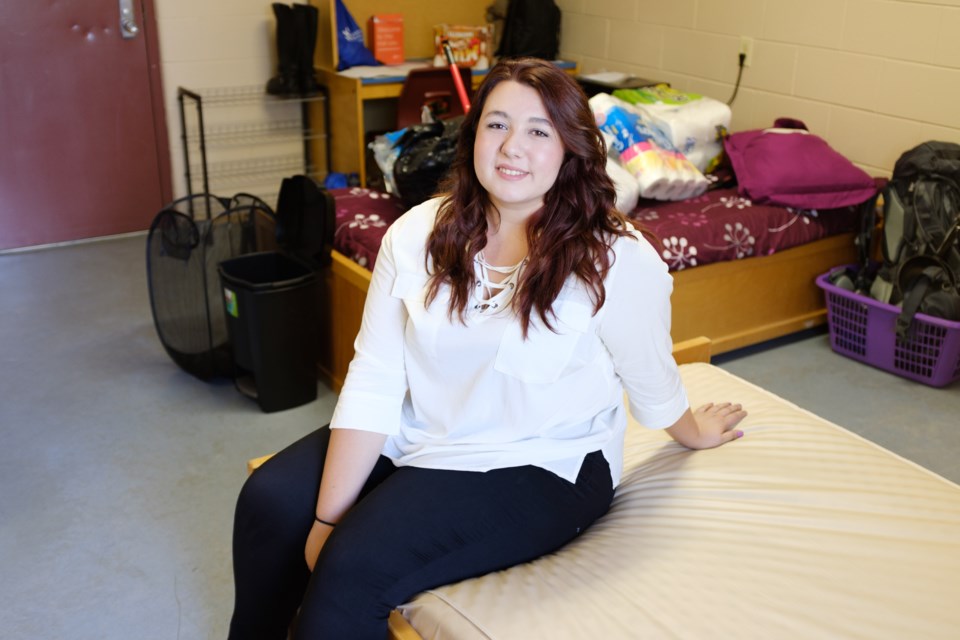Sydney Mires didn’t tell her parents she got all Ds and Fs her first semester at Sault College last year — they found out when the grades were posted online over the winter holidays.
When her parents drove her back up to Sault College from St. Catharines where she’s from, it was to pack up her belongings and take her home.
With grades like that, they weren’t going to support her through another semester.
This past Sunday Mires came back to tackle college again.
College issues
Mires isn’t the only one at Sault College that has troubles in her first year of a course.
Matt Trainor, Sault College's director of student services, said that program retention rates are the lowest in the first year compared to others.
After the first year 22-24 per cent of students either drop out or change programs he said.
He describes it like a kind of a hump-year in terms of challenges.
“The first year is the toughest year but as students become more engaged in their program, beyond that, their chances of success are much greater,” he said.
Trainor said amongst typical direct entry students — those aged 17-19 — the biggest challenges are related to being away from home the first time.
“Students are away from home for the first time, they’re are going to be making their own choices, some of those aren’t as good as they may think. They might get themselves in trouble experimenting with new things. (But) some are fine,” he said.
Mires’ first experience at College
When Mires came to Sault College last year, she was fresh out of high school.
She originally decided on the college after watching an online video about the Adventure Recreation and Parks Technician program.
If you search for videos about the program online, what comes up are students on canoes in unpopulated waterways, hiking through forests, on beaches, and even climbing mountains in the snow.
It brought her back to times she spent in nature with her grandfather in Muskoka.
"I thought, this is what I want to do with the rest of my life,” said Mires. “I don’t want to be stuck in an office.”
Moving to college in 2016 was her first time living away from home and the furthest she’d ever been.
She says her Sault College residence time was one of the best experiences of her life and she made friends from across Canada.
“I made so many friends here . . . everyone was a big happy family," she said.
Mires describes herself as a personable and social person who works best with other people.
But her connectedness with people proved to also be an emotional rollercoaster of distraction from school.
Halfway through the semester, her roommate, with whom she was very connected, moved back to PEI.
“I just laid in bed all day and didn’t get out much,’ she said.
But Mires also had academic challenges.
“I was fantastic with outdoor classes and going to the wood lot (the program’s outdoor training area), but paperwork has never been my strong suit."
She failed three classes her first semester and the rest of her grades were Ds, she said.
When her parents found out, they decided that they were pulling her out of school.
Over the winter holidays, they drove back up to the Sault, packed up her belongings, and moved her back into their house in St. Catharines.
“I bawled my eyes out, it was a very emotional time,” said Mires, who was saddened to leave her dormitory family behind.
Coping at school
Sault College has several ways for students to cope with academic issues said Trainor.
One of those is the ‘Students at Risk’ initiative.
Through this initiative, faculty and staff that interact with students on a regular basis will alert student success advisors when students seem like they may be in some sort of academic trouble, like when their grades drop and the student doesn’t seek tutoring or if they are suddenly absent from a lot of classes.
The school also offers students with several resources for other problem.
Any students that suffers from mild or severe mental health issues have support through counsellors, psychologists, or physicians said Trainor.
How Mires’ bounced back
After having to leave college, Mires decided to pull herself together.
To boost her grades, she re-enrolled into high school and she got a job as a cashier at Tim Hortons.
While living at home, she saved every penny she could.
“When it came time to apply, I convinced my parents to let me go back to college if I paid my own way,” said Mires. “If I can change what I did last year and pay my own way there, my mom said she’d be supportive. It took a lot of convincing for my father to let me back," she said.
Mires was accepted back into the school, and her program started on Sept. 5.
For the next two years, she’ll be studying the great outdoors working towards her dream job of tagging wolf migrations in Algonquin Park.
Looking back at last year, Mires thinks she might have been distracted with her social life.
This year she still wants to connect with people, but she plans to do it either through school activities, athletics, a club, or a job on campus — something that won’t distract her from her studies.
At the Sault College residences Sept. 3 move-in day, Mires was excited to be back at campus.
“Being up here right now, my parents had to tell me to calm down — I was so excited,” she said.
Mires said, before leaving, her dad told her that he loves her, he knows she’ll do great things, and that she better make him proud.
